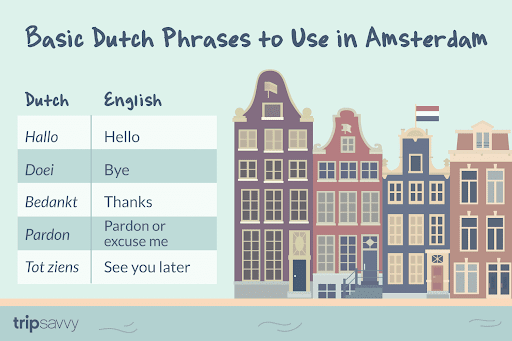While going to a new country to work can be an exciting new adventure, it may also mean a lot of headaches. The stress of relocation by itself is overwhelming for most of us, but the fear of not knowing (and having to learn) a new language only adds to the anxiety.
If you are thinking about going to the Netherlands to start a new job, you might have asked: “Do you need to speak Dutch to work in the Netherlands?” Well, in this article we’ll shed more light on whether learning Dutch is essential for foreign workers in the Netherlands.
Do I Need to Speak Dutch to Work in The Netherlands
How good are the Dutch at speaking English? According to DutchReview, between 90% to 93% of Dutchies can hold a full conversation in English, which puts the country on the first place of the EF English Proficiency Index out of 116 non-English-speaking countries.
This level of English proficiency in the country is quite remarkable, and places the country among the most inviting prospects for international job seekers even when the country’s official language is Dutch. However, English being such a widely spoken language, expats can get around even with less-than basic Dutch, as English has influenced almost every aspect of society in the country, especially the realms of education and business.
As a matter of fact, the municipality of Amsterdam recognizes English as an official language, giving home to one of the largest English-speaking communities in the Netherlands.

Dutch As An Official Language
The official and main language of the Netherlands is Dutch, and almost everybody speaks it in the Netherlands. Dutch is a Low Franconian, West Germanic language that originated in the Early Middle Ages, was later standardised in the 16th century, and gained official status in the early 1960s. Dutch is also called Netherlandic or Dutch Nederlands.
Dutch in international organisations is also one of the official languages of the Benelux Union and the European Union. Dutch, French, and German are the three official languages of Belgium.
This is because Belgium and the Netherlands are member states of these multilateral communities. Besides the widespread Standard Dutch, various dialects can essentially be boiled down to these minority languages and subgroups: West Frisian, Low Saxon, and Low Franconian.
In the Netherlands, many companies conduct their operations in English, even if they are locally based. This is especially true in industries with a significant international presence, such as technology, finance, and tourism.
English proficiency is viewed as an essential asset, facilitating seamless communication between businesses and their global partners or clients.
On top of that, the Netherlands is renowned for its outstanding higher education institutions, which attract students worldwide. Many higher education courses are taught in English, providing an enriching academic experience for local and international students.
This internationalisation of education enhances the learning environment and contributes to a higher level of English proficiency among the Dutch population.
Do You Need to Speak Dutch to Work in The Netherlands: The Dutch-English Connection
The Dutch people are known for their multilingual capabilities, and their proficiency in English is no exception. Surveys have consistently shown that many Dutch citizens are fluent or proficient in English, making way for relaxed language requirements in the Netherlands when it comes to speaking Dutch for foreigners.
This widespread adoption of English as a second language stems from a strong focus on language education in schools, where English is typically taught from an early age.
Exposure to English-language media, such as television shows, movies, and music, further reinforces language skills and fosters a culture of linguistic openness.
As a result, interacting with locals in English is often effortless, as most people in Holland are more than willing to switch to English to accommodate foreigners.
For international job seekers considering the Netherlands as their work destination, the prevalence of English brings immense relief, as they can choose from a high number of, if nothing else, multilingual jobs in the Netherlands.
While official language skills are undoubtedly advantageous, they are not always necessary to secure employment opportunities. As a matter of fact, in most cases you may even have to have an English CV to apply to jobs in the Netherlands.
Many Dutch companies actively seek employees with strong English language abilities.
Still, it’s essential to note that while Dutch language skills might not be obligatory for specific job roles, having some level of proficiency or at least showing a willingness to learn the local language can significantly enhance one’s experience living and working in the Netherlands.
Embracing the Dutch language can help foster better integration into the local community, enhance professional networking opportunities, and enable a deeper understanding of Dutch culture and traditions.
What Level of English or Dutch Is Required?
The language requirements for some jobs in the Netherlands are generally less strict.
While a higher level of English will be more meaningful in white-collar roles, where communication (often on an international level) is more prevalent, but for most blue-collar jobs, advanced and basic levels of English are more than sufficient. For instance, B1 and B2 levels of English are often more than enough for the agriculture, hospitality, and construction sectors, where you will find a lot of employees who may not be native Dutch speakers.
All in all, while Dutch proficiency and language skills are required for all roles, employers will often prioritize practical skills and experience over language proficiency for jobs in these sectors. Still, this doesn’t mean that you don’t have to use English or take basic Dutch language courses. Both languages can be highly helpful in your daily interactions with your colleagues at the workplace.

Learning the local language can contribute to a better work experience and overall better integration into the local community. Lastly, it’s also crucial to remember that the specific language requirements will mostly depend on the employer and the region. In areas with higher concentrations of international workers, companies may operate in English to support the diversity.
When Does It Make Sense to Learn Dutch?
While Dutch proficiency isn’t required for most foreign workers, it can be a valuable investment in several situations, leading to a more enriching experience both professionally and personally.

To be more specific, here are a few scenarios when learning the local language makes complete sense.
Long-Term Stay
Moving to work in the Netherlands in the long term is clearly a scenario when learning Dutch could significantly improve your experiences both on the job and in your day-to-day life. It will enable you to communicate with locals more effectively, participate in social activities, and integrate into the local community.
Career Advancement
Learning Dutch can be a game-changer for foreign workers aiming for career growth within Dutch companies. While English proficiency is often sufficient for entry-level positions or jobs with an international focus, higher-level roles may require Dutch language skills to interact with colleagues, clients, and management effectively.
Local Work Culture
Learning Dutch can help you better adjust to the work culture and dynamics in the country. Communicating in Dutch can facilitate smoother teamwork and collaboration with your Dutch colleagues.
Job Opportunities
When applying for more jobs in the Netherlands, you’ll see that some industries may prefer Dutch-speaking candidates more strongly. Learning the language can expand your job opportunities and can help you to become a great candidate for roles in various sectors.
Personal Enrichment
Learning the local language can provide a sense of accomplishment and personal satisfaction. It immerses you more fully in Dutch culture, traditions, and everyday life.
Social Interaction
Engaging with Dutch locals in their native language can lead to more meaningful social connections. It helps break down barriers and foster a sense of belonging in the community.
Navigating Daily Life
While many Dutch people speak English fluently, some essential services and interactions, such as dealing with Dutch government agencies or reading official documents, may be in Dutch. Knowledge of the language can make everyday tasks more manageable.
What Is the Best Way to Learn Dutch?
Understanding Dutch and learning the language shouldn’t be a hassle. Here are a few practical ways to up your skills while working in the Netherlands:
- Dutch Language Courses: There are several language courses you can take both offline and online. Look for an option with flexible schedules so school doesn’t interfere with work.
- Use Language Apps: Make use of language learning apps like Duolingo or Babbel to practice Dutch on the go. These apps often offer interactive exercises and can help you learn at your own pace.
- Workplace Language Support: Sometimes, your employer may offer language support or Dutch lessons. Some companies provide language training as part of their onboarding process.
- Language Exchange with Colleagues: Another great way to learn the language is through socialising with your Dutch colleagues during breaks or after work. Language exchanges can be a fun and informal way to improve your language skills.
- Work-Related Vocabulary: Understanding workplace terminology can be particularly useful for effective communication at work. Even though you won’t be able to make full sentences, knowing and understanding the most commonly used Dutch words in your field can be beneficial.

Remember: if you only learn one word per day, in just a few weeks, you will have a decent vocabulary.
Final Thoughts
So, do you need to speak Dutch to work in the Netherlands? The answer is not, but almost definitely, you will need to be able to know the basics of English to get hired. If you’re ready to embark on your journey to work in the Netherlands, we are here to support you every step of the way.
Register on our website today and access professional assistance to secure a job with accommodation, making your transition to this diverse and exciting nation as smooth and successful as possible. Your new job in the Netherlands awaits – let us help you make it a reality!

 English
English  Lietuvių
Lietuvių  Latviešu
Latviešu  Polski
Polski  Português
Português  Română
Română  Slovenčina
Slovenčina  Magyar
Magyar  Русский
Русский  Espanol
Espanol  България
България  Čeština
Čeština  Italy
Italy  Croatia
Croatia  Greek
Greek 

